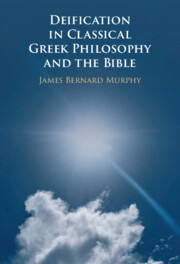Book contents
- Deification in Classical Greek Philosophy and the Bible
- Deification in Classical Greek Philosophy and the Bible
- Copyright page
- Dedication
- Epigraph
- Contents
- Introduction
- Chapter 1 Theology as Anthropology, Anthropology as Theology
- Chapter 2 Heroic Deification in Ancient Greek Religion
- Chapter 3 Ironic Deification in Socrates
- Chapter 4 Civic Deification in Plato
- Chapter 5 Developmental Deification in Aristotle
- Chapter 6 Deification as Intimacy with God in the Bible
- Conclusion
- Acknowledgments
- Select Bibliography
- Index
Chapter 3 - Ironic Deification in Socrates
Published online by Cambridge University Press: aN Invalid Date NaN
- Deification in Classical Greek Philosophy and the Bible
- Deification in Classical Greek Philosophy and the Bible
- Copyright page
- Dedication
- Epigraph
- Contents
- Introduction
- Chapter 1 Theology as Anthropology, Anthropology as Theology
- Chapter 2 Heroic Deification in Ancient Greek Religion
- Chapter 3 Ironic Deification in Socrates
- Chapter 4 Civic Deification in Plato
- Chapter 5 Developmental Deification in Aristotle
- Chapter 6 Deification as Intimacy with God in the Bible
- Conclusion
- Acknowledgments
- Select Bibliography
- Index
Summary
Socrates often said that he was merely a human being with no share in divine wisdom or virtue; but Socrates himself lived a life of superhuman self-control, wisdom, and virtue. There is an ironic contrast between his verbal professions of humility and the commanding power of his own heroic life. For example, despite his avowals of ignorance, Socrates also claimed to receive personal admonitions directly from the gods. My portrait of Socrates is based on the contrast between how he saw himself (in the Apology of Plato) and how he was viewed by his students (in Alcibiades’ memoir in Plato’s Symposium). Socrates presents himself as all-too-human, but his students saw him as quasi-divine. Despite his verbal modesty in the face of divine wisdom, Socrates’s own life and death became the very paradigm of how a human being can become godlike by means of rational discipline.
Keywords
- Type
- Chapter
- Information
- Deification in Classical Greek Philosophy and the Bible , pp. 99 - 128Publisher: Cambridge University PressPrint publication year: 2024



